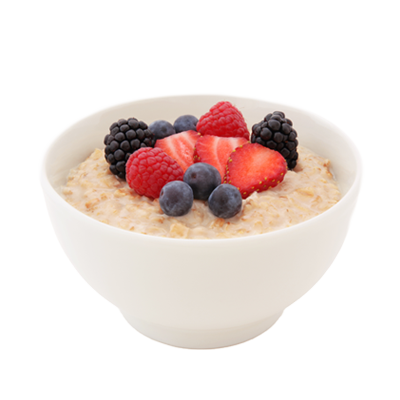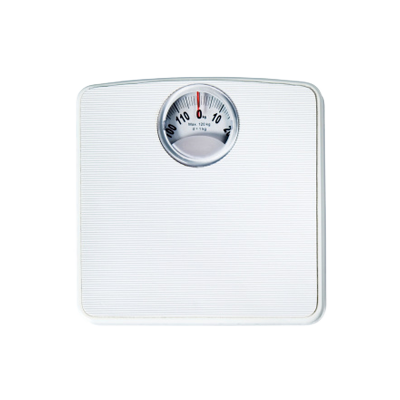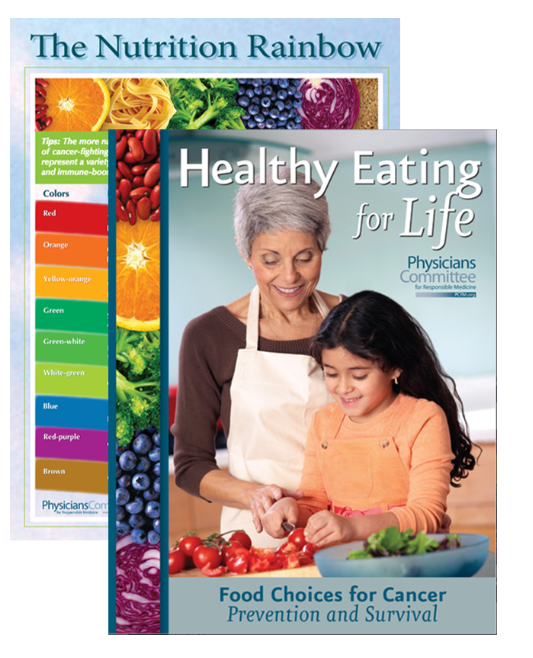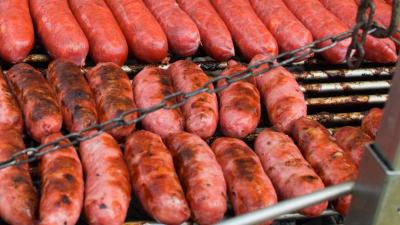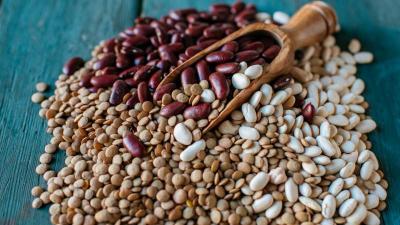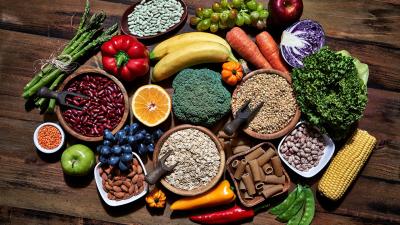Colorectal Cancer
Fight Colorectal Cancer With a Plant-Based Diet
Two powerful steps you can take to protect against colorectal cancer start on your plate: Eliminate red and processed meat—such as bacon, ham, and hot dogs—and fill up on fiber.
The American Cancer Society (ACS) estimates more than 2 million new cancer cases and more than 600,000 cancer deaths in the United States in 2024.1 Of particular concern is the dramatic rise in colorectal cancer among young men and women and the persistent racial disparities in cancer risk. According to the ACS 2024 annual report, colorectal cancer (CRC) was the fourth leading cause of cancer death in the 1990s and has risen to the leading and second leading cause of cancer death in men and women, respectively, aged 40-49 years in 2021. CRC also moved up to the leading cause of cancer death in men aged 20-39 years and the third leading cause in women in the same age group following breast and cervical cancer.
But there are steps you can take to significantly reduce your risk, including choosing healthful, plant-based foods. Evidence suggests that dietary habits may influence both colorectal cancer incidence and progression:
Avoiding Red and Processed Meat
The World Health Organization has determined that processed meat is a major contributor to colorectal cancer, classifying it as “carcinogenic to humans.” Fifty grams of processed meat, which is just one hot dog or a few strips of bacon, consumed daily increases the relative risk of cancer by 18% according to the International Agency for Research on Cancer (IARC).2 Consuming 100 grams of red meat per day, or a steak the size of the palm of your hand, has been found to increase the relative risk for colorectal cancer by 10% and colon cancer by 17%.3
The association between meat and colorectal cancer risk has been explained by the presence of carcinogenic compounds including nitrosamines, polycyclic aromatic hydrocarbons, and heterocyclic amines (carcinogens formed as a result of high-temperature cooking) and by the pro-oxidant effects of heme iron. Foods high in saturated fat and cholesterol, higher serum cholesterol and triglycerides, and higher levels of oxidized LDL are also associated with greater colorectal cancer risk.4-6
Choosing High-Fiber Foods
Fiber has been linked to a reduced risk for colorectal cancer. Fiber, which is found only in plants, is abundant in fruits, vegetables, whole grains, and legumes. Studies of both total fiber intake, as well as high-fiber foods individually (fruits and vegetables, whole grains, legumes, and nuts), have all revealed protection against colorectal cancers. One study of nearly 200,000 people found a nearly 40% lower risk for colorectal cancer in men who ate more than 35 grams of fiber per day, compared with those who ate roughly 13 grams per day.7 A meta-analysis found a 12% lower risk for colorectal cancer in those who ate the most total dietary fiber, and consumption of three servings per day of whole grains was also associated with a 17% lower risk.8 Another meta-analysis found that those who eat the most fruits and vegetables reduced their risk by approximately 10%, compared with those who ate the least.9 Legumes and nuts have also been associated with a reduced risk.10-11
Fiber bulks up the stool, helping it to move through the intestines more quickly, reducing what is called the gastrointestinal transit time. By expelling our stool more regularly, and digested food having less time in the intestines, this reduces the time that our intestinal cells are exposed to carcinogenic compounds, such as those found in meat, which may contribute to the reduced risk of colorectal cancer. Fiber may also be representative of a person’s overall diet quality. Since fiber is only found in plants, it is reasonable to assume that someone consuming more fiber is consuming more plant-based foods, which are high in antioxidants that combat DNA damage, and consuming fewer animal foods, which contain carcinogenic compounds, as discussed below. Fiber also promotes a healthy gut microbiome, which may play a role.
Another way fiber helps reduce risk of colon cancer is in relation to bile. Bile acids enter the intestine to help digest fat from the foods we eat. However, bacteria in the gut can turn the bile acids into chemicals which promote colon cancer. Fiber can act like a security guard and bind with these bile acids to remove them from the intestines.12 Also, bacteria in the colon ferment the fiber creating a more acidic environment, which may make bile acids less toxic. Research confirms that high-fiber diets protect against colon cancer and can even increase survival of those already diagnosed with the disease.10,13-15
Maintaining a Healthy Weight
A number of studies have found a link between excess weight and death from colorectal cancer. Based on epidemiological studies, it has been estimated that 14% of cancer deaths in men and 20% in women may be attributable to obesity alone.16 Individuals with a BMI of 40 or greater have a roughly 45% greater risk for colorectal cancer, compared with those who are at a healthy weight (BMI 18.5-24.9).16 Individuals who are mildly or moderately obese appear to have a 10% and approximately 35% greater risk, respectively. One meta-analysis concluded that for every 5 kilograms of weight gained during adulthood, the relative risk for colorectal cancer increased by 4%.17 For a weight gain of roughly 30 pounds, the risk increased by 22%, compared with individuals who had maintained their previous weight. Learn more about how a plant-based diet can help maintain a healthy weight. Research has also found that exercise may decrease the risk of colorectal cancer, especially in those with a high BMI.18
Type 2 diabetes
Research from 2023 suggests that the elevated blood sugar levels seen in type 2 diabetes increases the risk of colorectal cancer. In a study largely made up of African Americans, those with a diabetes diagnosis were 47% more likely to develop colorectal cancer than those without diabetes.19
Screening
Regular screenings and timely removal of precancerous lesions are key. American Cancer Society guidelines now recommend that screening begin at age 45.20 Be sure to work with your health care provider to find the best screening options for you.
Plant-Powered Prescription for Colorectal Cancer
- Eliminate processed and red meat.
- Consume at least 40 grams of fiber every day by choosing whole grains over refined grains and eating half a cup of beans daily.
- Consume at least two servings of fruit and three servings of vegetables per day, which are good sources of fiber and antioxidants.
Processed meat has been categorized as a Group 1 carcinogen by the WHO since 2015, yet bacon and hot dogs are still served in many hospitals and schools. We can do better by promoting plant-based foods instead.
Roxanne Becker, MBChB, DipIBLM, Medical Editor and Educator, Physicians Committee
Follow these steps to reduce the risk for colorectal cancer:
Avoid red and processed meat.
According to the World Health Organization, one 50-gram serving of processed meat per day increases the risk of colorectal cancer by 18%.
Eat fiber.
Fiber has been linked to a reduced risk for colorectal cancer. Fiber, which is found only in plants, is abundant in fruits, vegetables, grains, and legumes.
Maintain a healthy weight.
A number of studies have linked excess weight to increased risk for colorectal cancer.
Exercise.
Exercising for 4 or more hours per week is associated with roughly half the risk for colon cancer, compared with the risk for those who exercise 30 minutes per week or less, according to one large study.
Get screened.
Colorectal cancer risk is significantly reduced with regular screenings and timely removal of precancerous lesions. Most guidelines recommend that screening should begin at age 45-50 years for average-risk patients.
How to Lower the Risk of Colorectal Cancer
Neal Barnard, MD joins "The Weight Loss Champion" Chuck Carroll on The Exam Room Podcast to talk about ways to lower your risk of colorectal cancer.
Learn More
DID YOU KNOW?
Beans and other high-fiber foods satisfy hunger more than meat.
References
- Dizon DS, Kamal AH. Cancer statistics 2024: All hands on deck. CA Cancer J Clin. 2024. doi:10.3322/caac.21824
- International Agency for Research on Cancer. IARC Monographs evaluate consumption of red meat and processed meat. IARC Monographs. 2015. Accessed May 14, 2024. https://www.iarc.who.int/wp-content/uploads/2018/07/pr240_E.pdf
- Farvid MS, Sidahmed E, Spence ND, Mante Angua K, Rosner BA, Barnett JB. Consumption of red meat and processed meat and cancer incidence: a systematic review and meta-analysis of prospective studies. Eur J Epidemiol. 2021;36(9):937-951. doi:10.1007/s10654-021-00741-9
- Mei J, Qian M, Hou Y, et al. Association of saturated fatty acids with cancer risk: a systematic review and meta-analysis. Lipids Health Dis. 2024;23:32. doi:10.1186/s12944-024-02025-z
- Yang Z, Tang H, Lu S, Sun X, Rao B. Relationship between serum lipid level and colorectal cancer: a systemic review and meta-analysis. BMJ Open. 2022;12(6):e052373. doi:10.1136/bmjopen-2021-052373
- Bastide NM, Pierre FH, Corpet DE. Heme iron from meat and risk of colorectal cancer: a meta-analysis and a review of the mechanisms involved. Cancer Prev Res (Phila). 2011;4(2):177-184. doi:10.1158/1940-6207.CAPR-10-0113
- Nomura AM, Hankin JH, Henderson BE, et al. Dietary fiber and colorectal cancer risk: the multiethnic cohort study. Cancer Causes Control. 2007;18(7):753-764. doi:10.1007/s10552-007-9018-4
- Celiberto F, Aloisio A, Girardi B, et al. Fibres and colorectal cancer: clinical and molecular evidence. Int J Mol Sci. 2023;24(17):13501. doi:10.3390/ijms241713501
- Aune D, Lau R, Chan DS, et al. Nonlinear reduction in risk for colorectal cancer by fruit and vegetable intake based on meta-analysis of prospective studies. Gastroenterology. 2011;141(1):106-118. doi:10.1053/j.gastro.2011.04.013
- Zhu B, Sun Y, Qi L, Zhong R, Miao X. Dietary legume consumption reduces risk of colorectal cancer: evidence from a meta-analysis of cohort studies. Sci Rep. 2015;5:8797. doi:10.1038/srep08797
- Wu L, Wang Z, Zhu J, Murad AL, Prokop LJ, Murad MH. Nut consumption and risk of cancer and type 2 diabetes: a systematic review and meta-analysis. Nutr Rev. 2015;73(7):409-425. doi:10.1093/nutrit/nuv006
- Kritchevsky D. Diet, nutrition, and cancer: the role of fiber. Cancer. 1986;58:1830-1836.
- Song M, Wu K, Meyerhardt JA. Fiber intake and survival after colorectal cancer diagnosis. JAMA Oncol. 2018;4:71-79. doi:10.1001/jamaoncol.2017.3684
- Ben Q, Sun Y, Chai R, Qian A, Xu B, Yuan Y. Dietary fiber intake reduces risk of colorectal adenoma: a meta-analysis. Gastroenterology. 2014;146:689-699. doi:10.1053/j.gastro.2013.11.003
- O’Keefe SJ, Li JV, Lahti L, et al. Fat, fibre and cancer risk in African Americans and rural Africans. Nat Commun. 2015;6:6342-6356. doi:10.1038/ncomms7342
- Calle EE, Rodriguez C, Walker-Thurmond K, Thun MJ. Overweight, obesity, and mortality from cancer in a prospectively studied cohort of U.S. adults. N Engl J Med. 2003;348(17):1625-1638. doi:10.1056/NEJMoa021423
- Schlesinger S, Lieb W, Koch M, et al. Body weight gain and risk of colorectal cancer: a systematic review and meta-analysis of observational studies. Obes Rev. 2015;16(7):607-619. doi:10.1111/obr.12286
- Shaw E, Farris MS, Stone CR, et al. Effects of physical activity on colorectal cancer risk among family history and body mass index subgroups: a systematic review and meta-analysis. BMC Cancer. 2018;18(1):71. doi:10.1186/s12885-017-3970-5
- Lawler T, Walts ZL, Steinwandel M, et al. Type 2 diabetes and colorectal cancer risk. JAMA Netw Open. 2023;6(11):e2343333. doi:10.1001/jamanetworkopen.2023.43333
- Wolf AMD, Fontham ETH, Church TR, et al. Colorectal cancer screening for average-risk adults: 2018 guideline update from the American Cancer Society. CA Cancer J Clin. 2018;68(4):250-281. doi:10.3322/caac.21457


